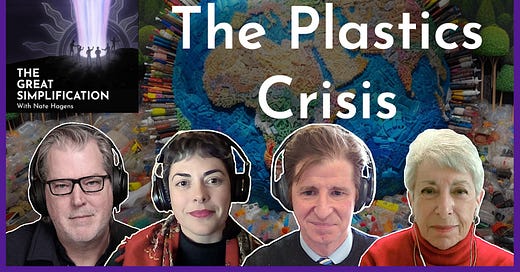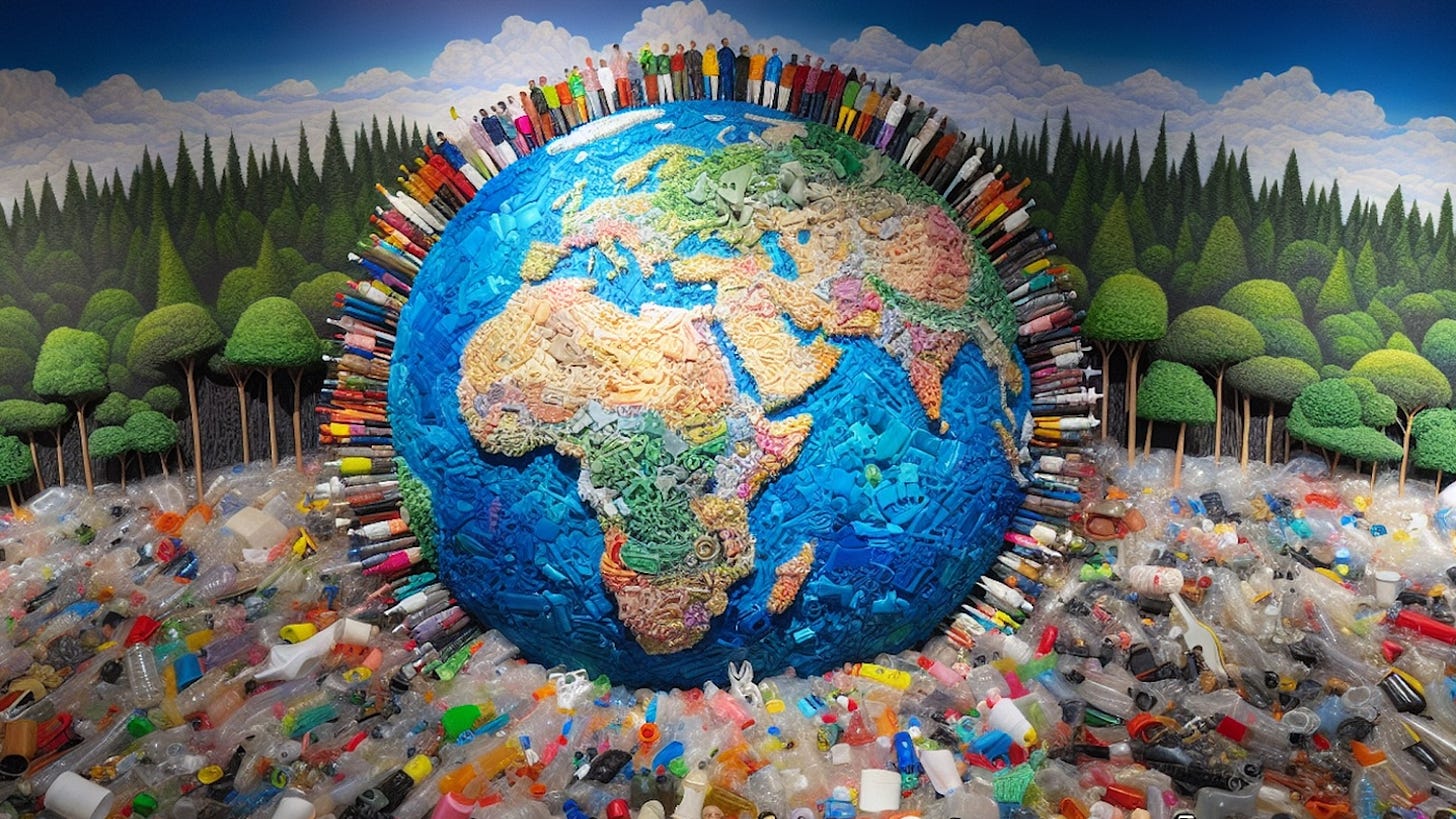Many of us are familiar with the problem of plastics as a distant issue in the ocean, primarily affecting fish and sea turtles. While these environmental effects are critical, the full scope of plastic’s repercussions on human health and well-being is largely unknown by most people, even as the research shows alarming – and growing – adverse effects. What do we need to know about this pervasive material and how it affects the human body?
Today, I’m joined by environmental health researchers Leo Trasande and Linda Birnbaum, as well as environmental policy advocate Christina Dixon, to discuss the harmful effects of plastic on human health and the ongoing global policy efforts to regulate the plastic and petrochemical industries. Our conversation dives into the risks of frequent plastic exposure, paths toward a world with reduced plastics use, and what it might mean for the economy if we made – or did not make – significant changes to the ways we use plastic.
How can we balance the requirement for essential plastics with the urgent need to reduce our production and consumption of these toxic materials? What further unknown health effects are still in need of research - especially in the case of thousands of untested chemicals used on the market? Lastly, what is the current state of regulation on plastic production and consumption, and how can everyday citizens play a role in shaping the future of the plastic industry?
In case you missed it…
In last week’s Frankly, I launched a community-driven project to capture and share these stories and examples of transformation - from small to large scales, with personal and global impact. We invite you to submit a short video (maximum three minutes) sharing how engaging with TGS has influenced changes in your life – whether through community projects, career shifts, consumption habits, or local initiatives. These submissions will be compiled into an upcoming episode, creating a tapestry of responses to, in turn, creatively inspire others to imagine how these ideas might 'rhyme' with possible changes in their own lives and communities.
(The link to submit videos will only be live for a few weeks, so if you’d like to share your story for this project, the time is now.)
If you appreciate The Great Simplification podcast…
Be sure to leave a review on your preferred podcast platform! Leaving reviews helps the podcast grow, which helps spread awareness of our systemic situation from experts in ecology, energy, policy, economics, technology, and community building so that we can better understand - and respond to - the challenges of the coming decade.
The Great Simplification podcast is produced by The Institute for the Study of Energy and Our Future (ISEOF), a 501(c)(3) organization. We want to keep all content completely free to view globally and without ads. If you’d like to support ISEOF and it’s content via donation, please use the link below.






I was so excited to finally live in a state that had robust recycling and composting when I moved to CA in 2015, after growing up and living in states that didn't. I jumped in head first to sort our waste and do it right! To my horror, this seemingly simple thing - sorting my own waste - led to my discovery of the realities of plastics. Ever since then, every time I walk into a store, I see an endless sea of waste and toxins that are harming all life on earth when I see the vibrant colors and shapes bursting from the shelves. I have to actively focus on somatic stress and grief management techniques to refocus and just get my grocery shopping done.
My recycling education was both devastating and invaluable. It cured me of the greenwashing beliefs that I didn't even know were actually causing me to do more harm as an individual, not less. I was able to change my own behaviors to the best of my ability, as much as one can when working within a system that, as highlighted in this episode, is largely out of individuals' control. Now, I try to help other people better understand the things they CAN do at the individual level. Sadly, it mostly falls on deaf ears because what I tell them completely goes against what they've been trained to believe. For example, years ago I made the decision to not place any plastics in recycling at all. I throw them straight in our landfill trash bag. My rationale is it has a better chance of going straight to the land fill, rather than ending up being dumped in the water system or burned into the air, and rather than wasting additional resources in its shipping to another country across the globe. Everyone I tell this to thinks I'm insane, and they keep chucking their plastics into their recycle bins.
I also try to explain how many products you think are recyclable are not because they are actually multi-layered with different materials you don't know about, which cannot be separated and thus cannot be recycled. In our household we only put fully recyclable metals, papers, and glass into our recycling bin. And even with these, you must strictly follow the instructions of your local waste management organization: If you contaminate a bin they have to throw the whole bin out and none of it is recycled but just gets sent to the landfill anyways. For example, milk cartons have a layer of plastic, and most lids -
even the metal ones - usually aren't recycled. My friend was shocked when she found out from the their waste management company that the cat food tins her mother had been dutifully placing in her recycle bin for years were never being recycled because they were coated metal that is too difficult to recycle.
(see https://recyclemore.com/aseptic-packaging-why-items-like-milk-cartons-are-difficult-to-recycle/ and
https://earth911.com/home-garden/recycling-metal-bottle-caps-jar-lids/).
MY RECYCLING JOURNEY & THE BASICS I LEARNED:
In 2016 I learned about how we in the U.S. ship most of our plastic waste to other countries that aren't really able to recycle it, how much of our plastics were ending up dumped in water systems or being burned, and how China was going to implement the waste import ban.
I learned about how extremely leaching plastics are across the board in all ambient conditions; and that we were absorbing, ingesting, and breathing the associated chemicals and microplastics every minute of our lives.
I had already stopped buying bottled water years before after watching the documentary Blue Gold: World Water Wars. But after gaining this new plastics knowledge, I immediately began researching to find the best changes that are feasible for a typical individual/ household to reduce, reuse and avoid products with plastic as much as possible. That led me down another rabbit hole regarding the realities of cotton, textiles, and paper products, both in relation to plastics that are incorporated in products made with them, and to their own manufacturing and life cycles and the associated pollution and waste.
I looked into buying replacing the use of plastic shopping bags with cotton bags (or choosing paper instead when I forgot them), as well as only buying 100% cotton clothing and linens. I was dumb-struck again.
Here is an interesting article that focuses on different types of shopping bags and highlights the highly complex nature of this problem for our society. "Plastic, Paper or Cotton: Which Shopping Bag is Best?"
https://news.climate.columbia.edu/2020/04/30/plastic-paper-cotton-bags/
PLASTICS, COTTON & TEXTILES:
1) The cotton industry is the second dirtiest globally right after oil due to the chemical- and water-intensive processing it requires.
2) It's pretty much impossible to buy 100% cotton clothes since there are materials mixed in with the cotton.
3) A huge portion of our donated clothes and linens cannot be recycled at all - or even reused - once their use lifespan is over because of the plastics in them.
4) Because of all of this, everyone running out and buying tons of "reusable" cotton bags is actually contributing more to a huge problem.
5) Our fabrics are poisoning us and causing health issues, including skin allergies, because of the plastic materials leaching chemicals into us as we come in contact with them.
6) Our textiles are shedding micro and nano plastics everywhere, including into our water systems when we wash them.
PLASTIC VS PAPER:
1) Paper products also have a chemical- and water-intensive manufacturing process that is more polluting than plastic in some regards.
2) The U.S. doesn't require manufacturers to disclose all the ingredients in any paper products, so we're getting exposed to unknown types and amounts of toxins as our bodies and things we consume come in contact with them.
3) The stronger the paper product is, the more chemicals are used to make that possible (so your ultra strong and plush toilet paper is worse for you than the cheap stuff).
OTHER PLASTICS BASICS:
1) Plastics are in virtually everything we come in contact with, often in invisible ways: Chewing gum, shampoos, and homes are just a few crazy examples.
2) We breathe the VOCs that materials in our cars and houses off-gas, and we absorb chemicals when we touch plastic-containing objects.
3) As a product ages and degrades, the chemical amounts released change, sometimes decreasing sometimes increasing over time, depending on type.
(CROSS-POSTED IN YOUTUBE COMMENTS)
Great discussion once more. Christina is dynamite, she connects the dots so clearly! We do need systems change, as she notes. Problem: The people's lever on change is democracy, but that, so far, is proving unable to offset rapacious extractive capitalism (or authoritarianism, for that matter). Over-production of plastics, like the over production of all the other crap, is driven by the need for ever-increasing consumption, growth and profits. If you belong to the 1%, you're thrilled. Party on. For the rest of us humans, ff we are resigned to this economic "reality" - we're doomed. If the people could just figure out how to get their hands on the means of production, though... Nate, please DM Mr. Marx for a future episode?